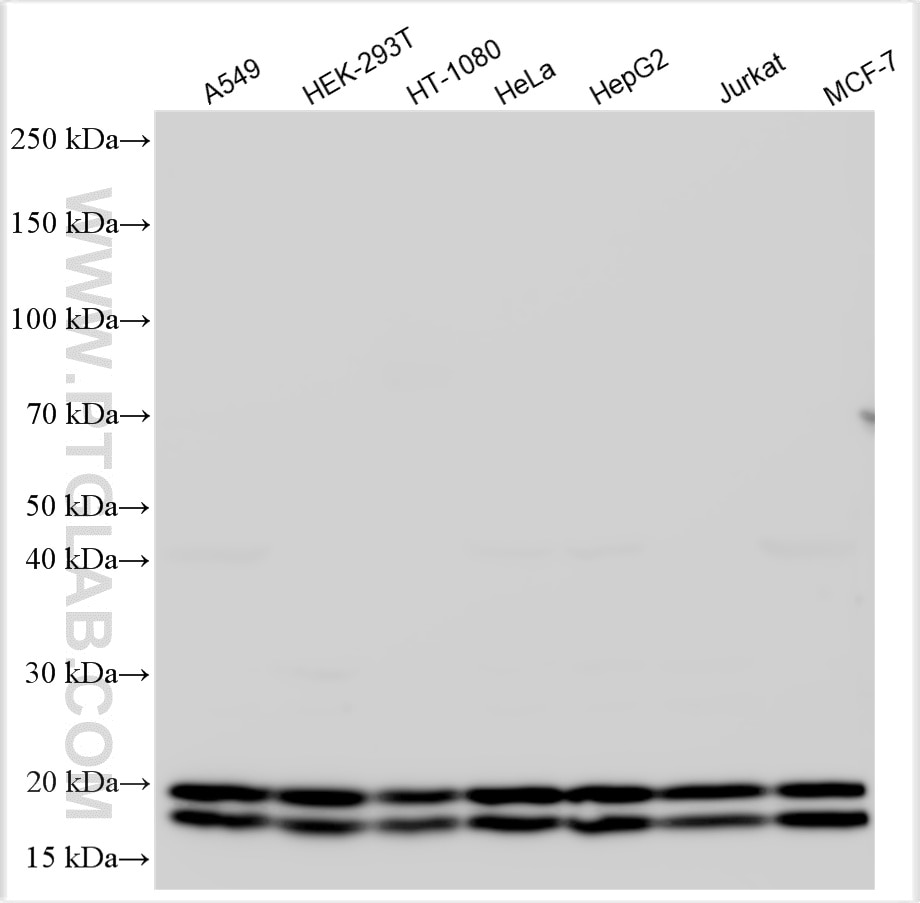Tested Applications
| Positive WB detected in | A549 cells, HEK-293T cells, HT-1080 cells, HeLa cells, HepG2 cells, MCF-7 cells, Jurkat cells |
Recommended dilution
| Application | Dilution |
|---|---|
| Western Blot (WB) | WB : 1:5000-1:50000 |
| It is recommended that this reagent should be titrated in each testing system to obtain optimal results. | |
| Sample-dependent, Check data in validation data gallery. | |
Product Information
33046-1-AP targets NME1+NME2 in WB, ELISA applications and shows reactivity with human samples.
| Tested Reactivity | human |
| Host / Isotype | Rabbit / IgG |
| Class | Polyclonal |
| Type | Antibody |
| Immunogen | NME1+NME2 fusion protein Ag37892 Predict reactive species |
| Full Name | NME1-NME2 readthrough transcript |
| Calculated Molecular Weight | 17 kDa / 20 kDa |
| Observed Molecular Weight | 17 kDa, 20 kDa |
| GenBank Accession Number | BC107894 |
| Gene Symbol | NME1-NME2 |
| Gene ID (NCBI) | 654364 |
| Conjugate | Unconjugated |
| Form | Liquid |
| Purification Method | Antigen affinity Purification |
| UNIPROT ID | P22392 |
| Storage Buffer | PBS with 0.02% sodium azide and 50% glycerol, pH 7.3. |
| Storage Conditions | Store at -20°C. Stable for one year after shipment. Aliquoting is unnecessary for -20oC storage. 20ul sizes contain 0.1% BSA. |
Background Information
NME1 and NME2 are associated with metastatic tumor suppression. NME1 and NME2 are multispecificity kinases phosphorylating serine, threonine, histidine, and aspartic acid residues of substrate proteins (PMID: 39032654). NME1 can catalyze the transfer of the terminal phosphate group of nucleoside triphosphates to nucleoside diphosphates to generate nucleoside triphosphates, which is crucial for DNA synthesis and repair. It also participates in cell signal transduction, proliferation, differentiation, and apoptosis. Reduced expression of NME1 is associated with increased tumor metastasis. For instance, in breast cancer, gastric cancer, and other malignancies, restoring NME1 expression can inhibit tumor invasion and metastasis. Similar to NME1, NME2 possesses nucleoside diphosphate kinase activity, participating in nucleotide metabolism and cell signaling regulation. It can form hexameric complexes with NME1 and also exists as homohexamers. Its functions overlap with those of NME1 to some extent but also exhibit unique roles in certain physiological processes. NME2 is involved in tumor metastasis regulation. However, its expression changes and specific mechanisms in different cancers may vary. In some tumors, NME2 expression is downregulated, while in others, it may be upregulated. For example, in hepatocellular carcinoma, reduced NME2 expression is associated with tumor progression and poor prognosis, whereas in ovarian cancer, elevated NME2 expression may promote tumor cell proliferation and metastasis.
Protocols
| Product Specific Protocols | |
|---|---|
| WB protocol for NME1+NME2 antibody 33046-1-AP | Download protocol |
| Standard Protocols | |
|---|---|
| Click here to view our Standard Protocols |



